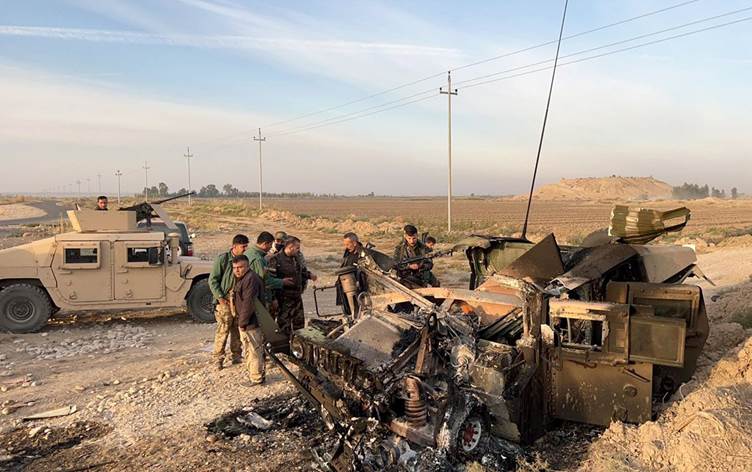Security vacuum is what statements agreed on about recent ISIS attacks in Iraq
ERBIL, KRG, Iraq (North Press) – The recent attacks of ISIS on many areas in the Garmiyan and Makhmur in northern Iraq, in which at least 20 people, both civilians and soldiers, were killed, sparked a series of statements made by both officials in the Kurdistan region and Iraqi government.
These attacks come at a time when Iraq is preparing to form a new government, resulting from the early legislative elections, the results of which sparked controversy amid accusations of fraud.
Perhaps the biggest common denominator in the official statements about ISIS attacks are the warning of its growth and its danger to the security of the region, and calls for more cooperation and coordination between the Iraqi forces, including the Peshmerga, and the US-led Global Coalition to confront it.
Is there coordination to face the renewed threat?
Yesterday, the Iraqi President Barham Salih tweeted that the recent attack on Peshmerga positions in the Makhmur area is “alarming.”
Confronting the organization has become a must, Salih said, stressing the need to strengthen cooperation between the Iraqi army and the Peshmerga.
On the same day, the president of Iraqi Kurdistan, Nechirvan Barzani, made a statement urging greater cooperation between his government and Baghdad.
“Therefore, it is imperative to reassess the military conditions and capabilities, to take immediate actions to optimize coordination between the Iraqi army and the Peshmerga forces, with the participation and support from the international coalition,” he said.
This was supported by a statement issued by the Prime Minister of the Kurdistan Regional Government, Masrour Barzani, in which he called for “strong and tight cooperation between the Peshmerga, the Iraqi army and the Global Coalition as soon as possible, to proceed with taking the necessary measures to end the growth of ISIS terrorists and their attempts to organize their ranks.
The United Nations, for its part, took successive positions, and demanded, in a brief statement, “Strengthening security coordination and cooperation in the ongoing battle against terrorism.”
“Makhmur ISIS attacks will not go unpunished,” Iraqi Prime Minister Mustafa al-Kadhimi said in a statement published by his spokesman.
“The Peshmerga forces are a part of the national defense system and work side by side with their brothers in our valiant armed forces to secure the country,” he stated.
The premier stressed ISIS cannot be “underestimated” as the terror group continues to conduct hit-and-run-style attacks.
What can be concluded from these stances?
The warnings of ISIS threat and the demand for strengthening cooperation to confront it have been agreed upon in the stances, and this apparently indicates Iraq’s lack of what was mentioned. It also indicates to the security vacuum which Iraqis experience.
Actually, the calls for cooperation and coordination come months after the agreement between the Ministry of Peshmerga and the Ministry of Defense in Baghdad to form joint brigades.
Although the agreement, which was approved by al-Kadhemi, reached advanced stages, it has not been implemented on the ground. The task of these brigades is to deploy in the disputed areas which witness security gaps that allow ISIS to move and launch its attacks.
This is what happened last week, when ISIS militants launched three consecutive attacks in Garmiyan, in which seven Peshmerga members were killed and several others were wounded.
On November 2, ISIS attacked the village of Khedr Jija in Makhmur district and killed three civilians (brothers), as well as ten Peshmerga members, an attack described as the bloodiest.
The residents of this area and other areas of the disputed regions between Baghdad and Erbil, which extends from Khanaqin in the east to Sinjar in the west, suffer from ISIS threat, despite attempts to curb it.
Late in October, two members of the Peshmerga forces were killed in an attack by ISIS, west of the city of Tuz Khurmatu in Saladin governorate.
Two months ago, the areas of Kirkuk and Makhmur witnessed attacks by ISIS, which killed a number of members of the Iraqi army and police forces.
On October 26, 2021 an attack was launched in several villages in Muqdadiya district of Diyala governorate, carried out by ISIS. At least 15 civilians were killed in the attack.
4,657 people were killed, wounded and kidnapped, civilians and fighters as victims of 1,162 ISIS operations in Iraq from the beginning of 2018 until the end of October of this year, the Secretary General of KRG Ministry of Peshmerga, Jabar Yawar, said last week.
“ISIS has not ended, but rather lost ground. It still continues its terrorist operations in one way or another (…) and this proves the validity of the warnings,” he added.
According to the official in the Ministry of Peshmerga, it seems that ISIS has changed its operational strategy and is adopting another one after its territorial loss in 2017; it forms detachments to strike barracks, fire on security sites or carry out bombings, then it flees to its hideouts.
The Global Coalition has warned of the methods of the recent attacks adopted by ISIS. The US-led coalition also renews its demand for the Iraqi forces intensify efforts in confronting ISIS, and stresses that it still poses a threat.
This threat, however, comes at a time when the US-Iraqi agreement is coming to an end, as the US combat forces are scheduled to withdraw at the end of this year, and their presence is limited to advice, training and armament.
Although Iraqi officials confirm the readiness of the forces in the face of ISIS threat and the work to restore security and stability, observers believe that the US withdrawal may affect the security situation in the region.

